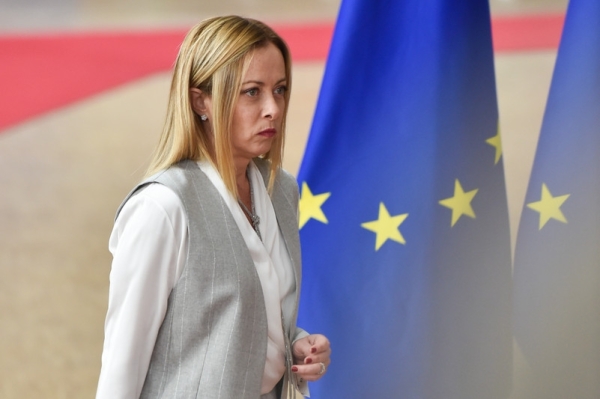Italy’s arbitrary Albania detention deal will harm EU
Just a few weeks ago, the Italy-Albania arbitrary detention deal that was proposed in November seemed mired in legal and political obstacles. But in a concerning acceleration of plans, the Italian parliament is now about to complete the ratification of the deal and the Albanian Constitutional Court green-lighted the possibility for the Albanian parliament to do the same, which is expected in days.
These crucial decisions propel the Italian prime minister, Giorgia Meloni, closer to implementing her proposal of arbitrarily holding thousands of refugees and migrants rescued at sea by Italian ships in detention centres located in Albania — outside of EU territory.
Despite serious concerns raised by the commissioner for human rights of the Council of Europe, legal experts, civil society representatives and many MPs in both states, the European Commission has so far chosen an alarming, if not collusive, stance on the legality of the Italy-Albania deal.
The CEU commissioner for home affairs, Ylva Johansson, affirmed that the agreement does not breach EU law because it works "outside the EU law". This is based on a preliminary legal assessment which has not been shared with the European Parliament.
The European Commission’s president Ursula von der Leyen praised the deal as a positive "example of out-of-the box thinking" last December.
Italy asserts that individuals rescued by its ships and detained in Albania will retain their right to apply for asylum in Italy, and that "vulnerable people" will not end up in the centres in Albania. Nevertheless, the plan poses tangible threats to the human rights of all people touched by it, both at sea and on land, in violation of EU and international law.
The agreement patently breaches Italy’s obligation to disembark people rescued at sea as promptly as possible following their rescue. It potentially adds up to two-to-three days at sea as the ships travel from the Central Mediterranean to the Albanian port of Shengjin.
People onboard the rescue vessels identified as "vulnerable’ would then be transferred again, this time to Italy, making their journey even longer. They would be the lucky ones.
Others, including those whose needs may be missed as not immediately visible — such as victims of torture, trafficking or gender violence, older minors, people with mental health issues — would be disembarked and detained in Albania.
Amid uncertainty on many details, the agreement makes it clear that those who are sent to Albania will not be able to leave the centres during processing. This subjects them to automatic detention, which is inherently arbitrary and therefore in breach of Italian, international and EU law.
Under the plans, asylum seekers arriving at the centres in Albania would be subjected to a so-called "border procedure", entailing accelerated processing of asylum applications at the border, as per Italian and EU laws. With anticipated reforms on the EU Pact on Migration and Asylum, the length of border procedures is being extended up to six months in total (even longer in some cases), whereas under Italian law people for whom authorities seek removal may remain in detention for even 18 months.
Italian jurisdiction — from afar
The Italian government has promised that Italian jurisdiction will be maintained, which means that rescued people should have access to the guarantees established under Italian and EU law.
Under this deal however, the right to seek asylum, including access to fair and effective asylum procedures, would be significantly curtailed in view of the physical distance between people detained in Albania and the authorities and others playing a key role in decisions affecting them — such as asylum commissions, lawyers and judges.
Serious questions remain unanswered, such as, will people be able to receive quality assistance from a lawyer of their choice, particularly when legal assistance and interviews are done exclusively remotely?
The crux of the matter is that Italy is picking and choosing the bits of EU law it plans to apply, putting aside guarantees offered by EU law, such as the obligation to avoid arbitrary, automatic detention for asylum applicants, and ensure alternatives are available.
The ratification law being approved by the Italian parliament states that legal guarantees coming from EU law will be applicable in centres in Albania "insofar as compatible" with the agreement.
In following this approach, the Meloni government is not only laying the ground for a host of human rights violations, but also offering a dangerous blueprint for other governments.
Once ratified, the agreement may still face legal challenges — including a case against the automatic detention of asylum seekers under Italian laws, which just found its way to the Court of Justice of the EU. But other EU institutions should not wait for this.
The European Commission must refrain from endorsing this approach and instead use all tools at its disposal — starting with a transparent and detailed legal assessment of the Italy-Albania deal — to ensure Italy’s full application of EU and international law.

